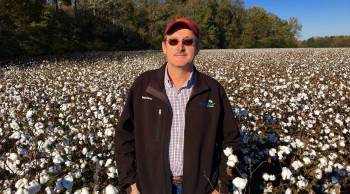Children keep Egypt’s cotton spinning
TEXT OF STORY
Bill Radke: The drive to increase American exports may get a little help from the weather. The U.S. is the world’s biggest supplier of cotton, and this wet spring and dry summer should make it a good year for cotton growers here. Now, when it comes to the best cotton in the world, that is another matter. As you know, it is the phrase “Egyptian cotton” on a towel or a sheet that will automatically raises the price. And who’s doing the hard work of harvesting Egypt’s precious cotton?
Reporter Julia Simon tells us in many cases it’s children.
Mohammad speaking in Arabic
Julia Simon: Sixty miles south of Cairo, the desert gives way to the fertile agricultural oasis of Al-Fayoum. I met 13-year-old Mohammed there, and he took me into the cotton fields. He stoops over to show me the plant’s yellow flowers.
Mohammed, in Arabic: Huwwa el otton, huwwa…
Cotton picking doesn’t begin until the end of the summer, so now is the time for maintenance of the crop — pulling weeds and picking worms off the plants. Mohammad, who’s worked the fields since he was 10, says he sprays the plants with a backpack full of pesticide.
Mohammed: When the plant is little, we spray it because of the worms and weeds and stuff. We put the pesticide on our backs and we walk like this.
He makes the sound of spraying and he and his friends laugh. Mohammad wasn’t the youngest child I met here.
Brince, Arabic: Ismy Brince. Andi khamza.
Five-year-old Brince began cleaning weeds from the cotton when he was four. He makes a little under a dollar for a few hours of labor.
Zama Coursen-Neff of Human Rights Watch says when children work in agriculture…
Zama Coursen-Neff: They may be working long hours in the hot sun without enough water to drink. They often do the same motions over and over again and children may develop back pain, neck pain, wrist pain — the complaints of a much older adult.
When I told Coursen-Neff about Mohammad spraying the pesticide on the cotton, she said that was very disturbing.
Coursen-Neff: Long-term exposure to pesticides is associated with brain damage, with hormonal disruptions. The fact is children should not be handling or applying pesticides. It’s simply too dangerous for them.
In Cairo, I went to the Egyptian Ministry of Agriculture, a large colonial villa with a grand marble staircase, to put these concerns to Amin Abaza, the minister of agriculture. He said that Egypt has strict laws governing child labor.
Amin Abaza: By law, anybody under 15 cannot really find work in the fields. This is by law and it is forbidden.
I told the minister that I had met children working in cotton fields under the age of 15.
Abaza: Where is that?
Simon: In Al-Fayoum.
Abaza: If the parents, if the parents are sending children to work for a fee, don’t think that the government can do something about it.
Abaza did make a point of saying that children in the cotton fields are not working with dangerous machinery.
Abaza: As long as they are not in jeopardy, I don’t think that we have to worry — especially if it’s in the summer vacations or something like that.
Back in Al-Fayoum most of the children I met were students, except for Dina. At 13 years old, she has never gone to class. She says the worst part of cotton farming is the foremen.
Dina: They hit us, if we do something wrong they hit us, and if we come late, like an hour late, they hit us.
The problem, says Nivine Osman of the World Food Program, is enforcement. She says small farms are exempt from government scrutiny — and the vast majority of Egypt’s cotton farms are under five acres.
Nivine Osman: The labor inspectors do not have the authority to inspect the work of the child in small farms, to stop or to monitor the hazards the child is exposed to or to combat child labor.
Osman currently heads a campaign against child labor in Egypt, and one of her project’s goals is to help Egypt update its list of hazardous occupations. If agriculture is added to the list, then labor inspectors can start going onto these small farms where the children are. Before I left Al-Fayoum, I asked Dina what she wanted to be when she grew up.
Dina: Ikhtar zayy doctora, mohandisa, hagat di.
I’d choose to be a doctor or an engineer, she said. Her foreman from the cotton fields was laughing at her.
Foreman: Hoomma fellaheen!
They’re farmers, the foreman said.
In Al-Fayoum, I’m Julia Simon for Marketplace.
Radke: You can see the kids you just met. We have photos from Julia’s trip to the Egyptian cotton farm. Check out this audio slideshow.
There’s a lot happening in the world. Through it all, Marketplace is here for you.
You rely on Marketplace to break down the world’s events and tell you how it affects you in a fact-based, approachable way. We rely on your financial support to keep making that possible.
Your donation today powers the independent journalism that you rely on. For just $5/month, you can help sustain Marketplace so we can keep reporting on the things that matter to you.


















